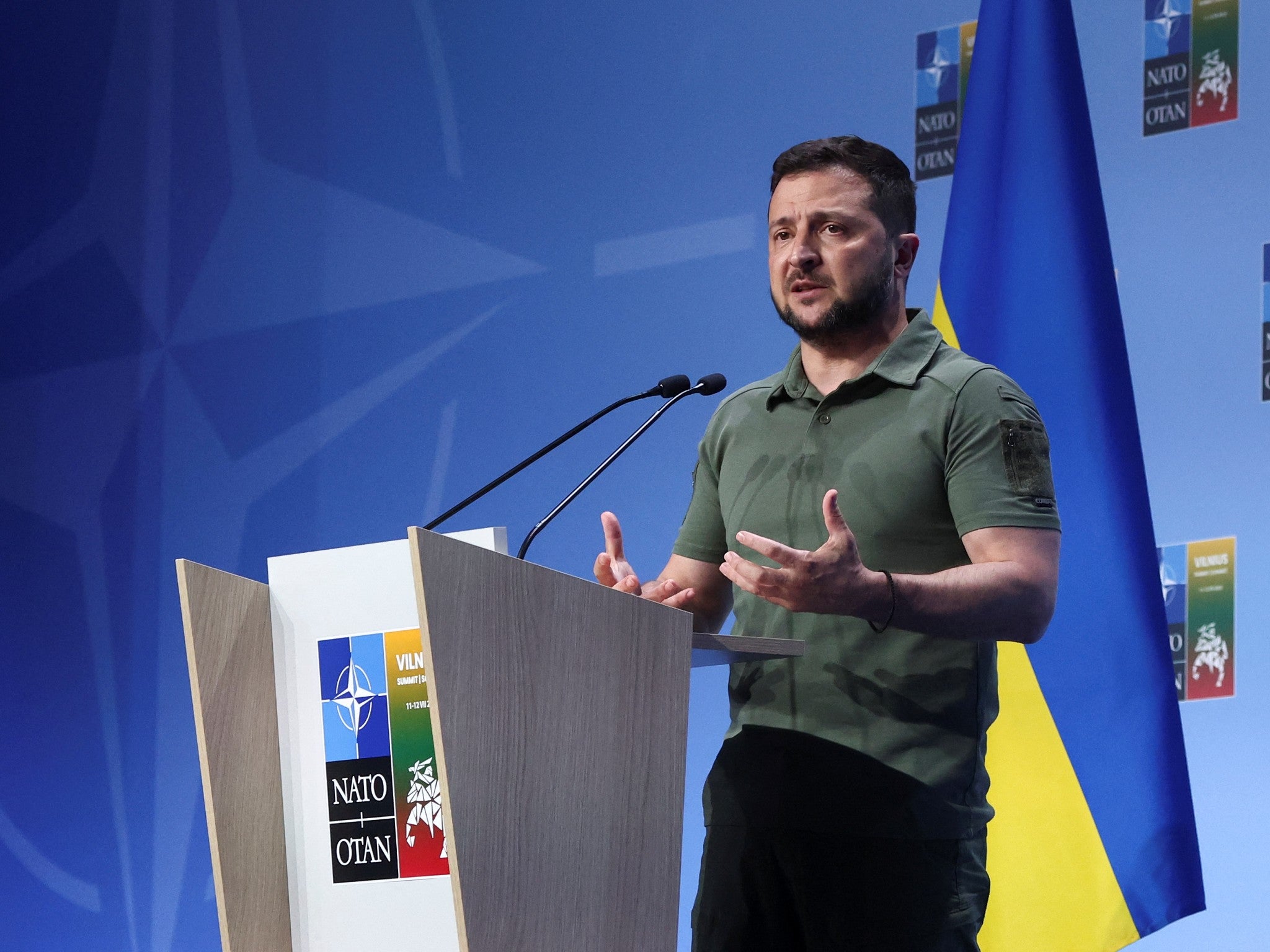Ukraine’s greatest weapon isn’t on the battlefield
A flash of anger over delays to Nato membership gave way to a more conciliatory tone from Volodymyr Zelensky at the summit in Lithuania, writes Chris Stevenson. But don’t expect him to back down on pushing Western allies for more help – his nation’s survival depends on it


In welcoming fresh pledges of more weapons, ammunition and the long-term security commitments made by members of the G7, Ukraine’s President Volodymyr Zelensky appeared – at least publicly – a happier figure on the second day of Nato’s summit in Lithuania than he did on the first.
On Tuesday, he had angrily denounced the “absurd” delays to his nation being given a timetable for the Nato membership it craves and then was left frustrated when the communique from the alliance said that Kyiv could join “when allies agree and conditions are met” – without laying out what those conditions were.
On Wednesday, Zelensky swallowed that disappointment and said that given the security support offered by the G7 – containing the UK, US, Germany, Japan, France, Canada and Italy – the summit was a “meaningful success”.
“Today there are security guarantees for Ukraine on the way to Nato,” Mr Zelensky said. “The Ukraine delegation is bringing home a significant security victory for Ukraine.” But the president could not resist a dig about the lack of a formal pathway to taking a seat at the Nato table: “We can state that the results of the summit are good, but if there was an invitation, they would be ideal.”
Zelensky knows the need for diplomacy. Remarks from the UK defence secretary, Ben Wallace, that “whether we like it or not” some Western allies want to “see a bit of gratitude” from Kyiv for their assistance make that clear. The prime minister, Rishi Sunak, said following those comments from Wallace that he knows Zelensky and his people are “incredibly grateful” and Zelensky, himself, later repeated the point.
But Zelensky also knows that Ukraine is in a fight for its survival thanks to Russia’s invasion of its territory – a fight that does not appear to have an end point in the near future, unless Kyiv is provided with all of the long-range weapons and fighter jets it believes it needs to defend itself and push Moscow’s forces out. That is what is driving the frustration that the Ukrainian leader has shown on occasion. Beneath the smiles and the headshakes at summits like this, that steely determination to keep pushing – both in private and public – will not go away.
There is recognition from Zelensky that Ukraine cannot join Nato while the war is happening, as the alliance’s mutual defence clause would make that too difficult. But he believes that in not offering a timetable for membership the alliance is handing Russia the “motivation” to continue its invasion. That is in contrast to some of the more reticent Western allies believing that issuing a full timeline would give Moscow a clear date past which to push its invasion. There is some logic in both sides of that particular argument.
For Zelensky, membership of an alliance like Nato, or a bloc like the EU is the only way to truly keep his country safe and that needs to be achieved as quickly as circumstances will allow. For more reticent allies like the US and Germany – beyond the fear of not wanting to face direct conflict with Russia – moving too quickly will set a precedent that will disrupt the other areas that such membership requires, such as democratic reforms and pushes against corruption.
The Ukrainian president will never truly see eye-to-eye with this viewpoint. His is a premiership of quick and decisive action now. Western allies have the luxury – at least in part – of saying “when we are ready” over diplomatic action, as long as they believe they are providing the support they think Kyiv needs. And that they do. Western leaders from Sunak, to Joe Biden and the Nato secretary-general, Jens Stoltenberg, were lining up to praise not just Ukraine’s resolve, but their own achievements in bringing Ukraine close to the alliance. Sunak spoke of “very significant movements, moments along Ukraine’s journey to membership”.
“Your resilience and your resolve has been a model for the whole world to see,” Biden told Zelensky, while acknowledging the Ukrainian president’s frustration at not getting everything he wants quickly enough.
“I promise you the United States is doing everything we can to get you what you need,” Biden said. “I look forward to the day when we’re having the meeting celebrating your official, official membership in Nato.”
Zelensky’s future mission does not change after this summit. He will need to keep pushing for military jets, more security guarantees and a myriad of other things. He can do little about the speed with which Western nations agree to or implement any of his requirements. Public displays of frustration – when used sparingly – may actually be his greatest rhetorical weapon, so we won’t have seen the last of such flashes of anger.



Join our commenting forum
Join thought-provoking conversations, follow other Independent readers and see their replies
Comments